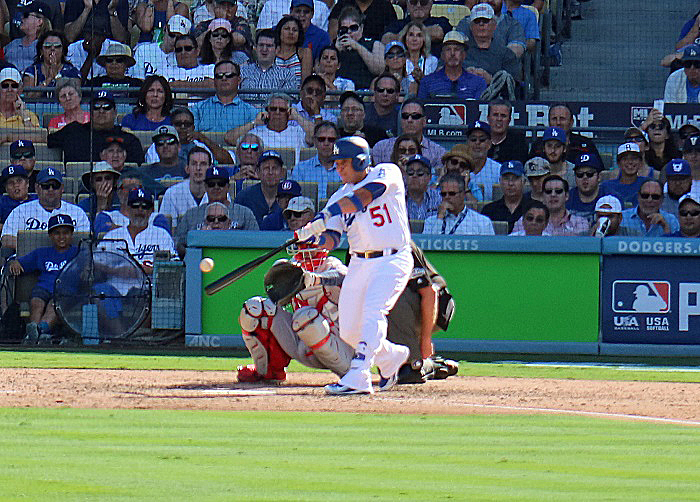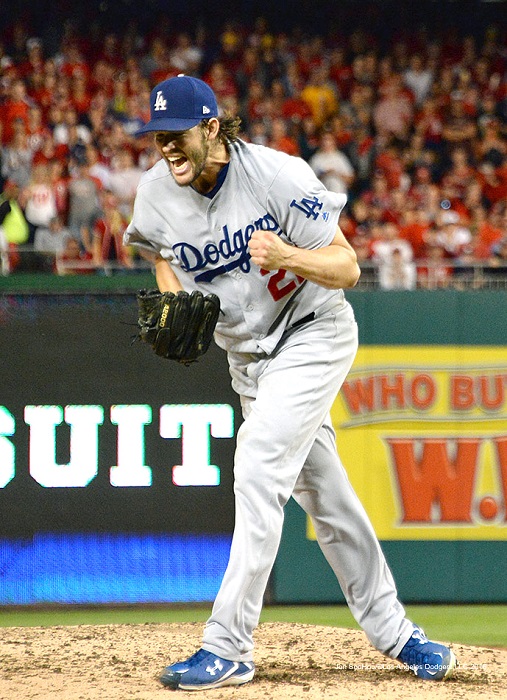* * * UPDATED October 11, 2016 at 9:00 am PT * * *
Anyone who has followed baseball for any length of time knows that every postseason series has a defining moment – that one hit or one pitch or one play that turns the momentum one way or the other.
For the Dodgers the most historic defining moment in their 133-year franchise history was Kirk Gibson’s epic “improbable – impossible” pinch-hit home run in Game-1 of the 1988 World Series which, in one swing, turned the highly favored Oakland Athletics into World Series runner-ups. It was also the last time that the Dodgers won a World Series title and it was 28 years ago.
Granted, there have been many other great but less obvious and memorable defining moments in Dodgers postseason play, such as James Loney’s grand slam home run against the Cubs at Wrigley Field in Game-1 of the 2008 NLDS and Juan Uribe’s famous failed bunt home run in Game-3 of the 2013 NLDS against the Atlanta Braves at Dodger Stadium, but they pale in comparison to Gibby’s blast, which continues to be voted as the biggest home run in World Series history.
But with the Dodgers down two games to one and on the brink of elimination in the 2016 NLDS, the defining moment – at least to this point – may not be what you think it is. Oh sure, you could argue that it was Justin Turner’s dramatic two-run home run that gave the Dodgers the lead and eventual 4-3 win in Game-1 or Corey Seager’s first-inning home runs in Game-1 and Game-2 respectively, but when we look back on this series days, weeks, months and years from now (perhaps as early as later this afternoon), the actual defining moment came when MLB Commissioner Rob Manfred postponed Game-2 for the threat of rain which, of course, never came.

Sadly, this will probably be the defining moment of the 2016 NLDS for the Dodgers.
After the Dodgers suffered a complete loss of momentum after clinching the NL West title for a franchise-record fourth consecutive time with one full week still remaining in the regular series, they finally appeared to regain it with their Game-1 win over the Washington Nationals last Friday night; this in spite of the fact that they scored only those four runs and collected only eight total hits. But when Game-2 was postponed by Commissioner Manfred for what was blatantly television favoritism over a significantly improving weather forecast (which, in fact, happened), the Dodgers lost that momentum and, more importantly, lost a crucial day off on Sunday.
Obviously you can argue that the same held true for the Nationals, but when you are the team already on the short end of that momentum thing, you’ve got nowhere to go but up, and the Nats did exactly that.

For a brief moment on Monday afternoon it appeared that Carlos Ruiz’s dramatic fifth-inning pinch-hit home run was going to be the defining moment of the 2016 NLDS. Unfortunately, they never scored again after than in their eventual 8-3 loss to the Nationals.
(Photo credit – Ron Cervenka)
Although the Dodgers starting rotation has been taking most of the heat for their team being only 27 outs away from elimination in the first round of playoffs … again, the real reason is their inability to hit with runners in scoring position … again.
Through the first three games of the Division Series, the combined Dodgers offense is a pathetic .220 with a .304 on-base percentage and .360 slugging percentage, most of which belongs to Corey Seager and Justin Turner. The most obvious black hole in the Dodgers offense thus far has been Adrian Gonzalez’s 2-for-13 (.154) and Yasmani Grandal’s 2-for-11 (.182). But without question it is their combined 2-for-18 (.111) batting average with runners in scoring position and the combined 23 runners that they have left stranded that have the Dodgers on the brink of postseason elimination … again.

With the very real possibility that there may not be a Game-5 on Thursday, the Dodgers would be absolutely foolish not to start Clayton Kershaw in Game-4.
(Photo credit – Jon SooHoo)
While hope springs eternal and all that, and with the likely pending announcement that Dodgers ace Clayton Kershaw will (probably) get the start today, and a right-hander going for Dusty Baker’s Nationals, the Dodgers will undoubtedly pull out all of the stops and have their best nine on the field when the first pitch is thrown at 2:08 pm (PT). But unless those best nine suddenly start hitting the ball early and often, it could very well be the first day of what will be a very long and painful off-season.
…and all because of the weather.
* * * UPDATED October 11, 2016 at 9:00 am PT * * *
Kershaw will start Game-4




 October 11th, 2016 at 9:00 am
October 11th, 2016 at 9:00 am  by Ron Cervenka
by Ron Cervenka  Posted in
Posted in 

I agree that the postponement of Game 2 was pivotal, not just because of the reasons stated above, but also because it limited our shaky starting pitching due to the resultant limited availability for Rich Hill in Game 5 (I am already planning on Game 5).
But as far as in-game turning points, for me it was Bottom of 4th Inning of Game 2; 2 out, Murphy on 1st, and a very light hitting Danny Espinosa at bat…HBP. This was followed by a 3-Run HR from Lobaton. The game and series turned on that one pitch to Espinosa. If Hill gets Espinosa in the 4th, then Lobaton leads off the 5th rather than with two on, followed by Roark or PH, and Trea Turner who still can’t hit a breaking ball very well. Thru 5, and then the bullpen comes into play. Lobaton’s HR woke the slumbering Nats, but it was the pitch to Espinosa that set that up.